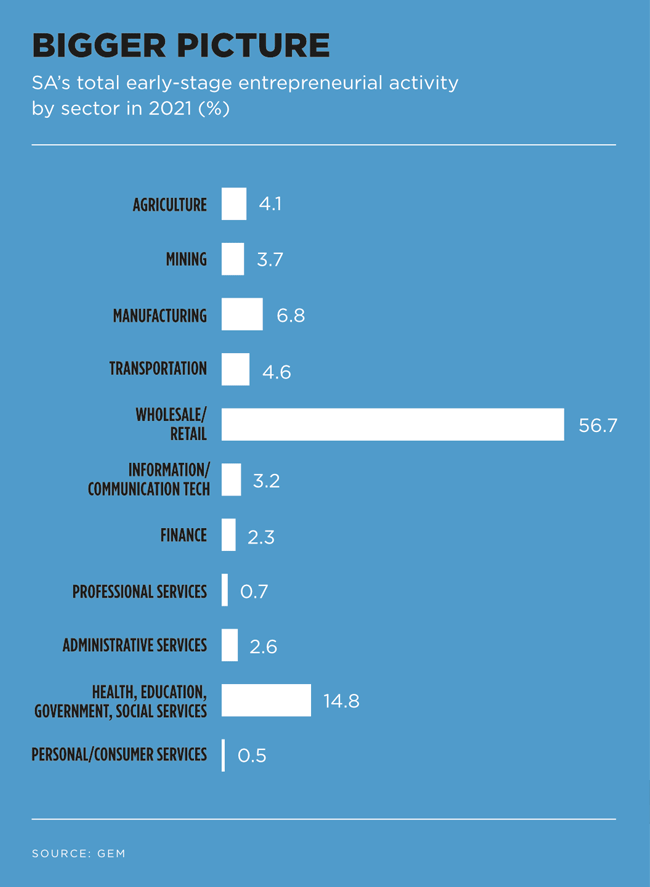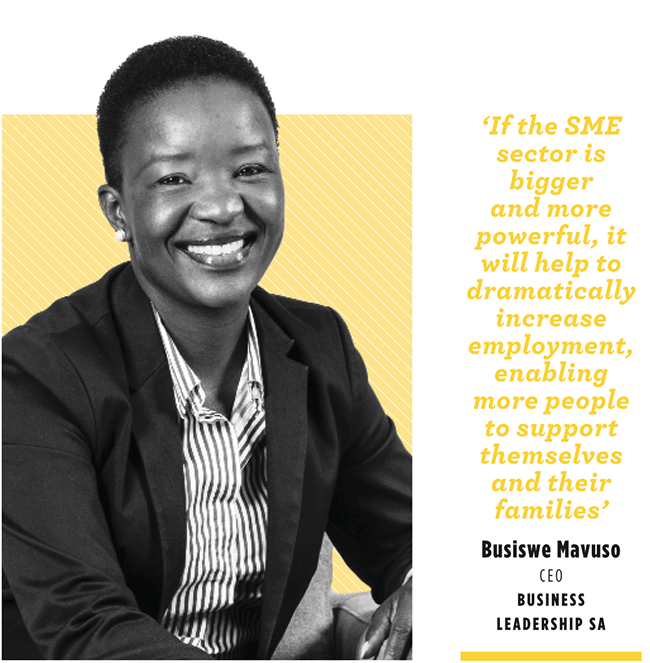If every small business in SA could employ one additional person, more than 2.4 million jobs would be created. Even if only half of the country’s SMEs were able to hire one extra person, it would still translate to 1.2 million new jobs, says Busisiwe Mavuso, CEO of Business Leadership SA (BLSA).
Using stats from the Small Enterprise Development Agency’s (Seda) SMME quarterly update for January to March last year, she illustrates the massive potential that small businesses hold to drive economic growth and create jobs.
‘The harsh realities of our misfiring economy, lack of electricity supply and high regulatory burdens mean it’s likely that only a handful will today be in such a position that they need to, or indeed want to, hire,’ she says in one of her weekly opinion pieces. Mavuso argues that for SMEs to thrive, organised business needs to continue to push government hard to accelerate the economic reforms designed to eliminate inefficiencies in the SA economy.
The Global Entrepreneurship Monitor ranks SA a disappointing 45th out of 50 countries in its National Entrepreneurial Context Index, which measures how favourable the environment is in terms of entrepreneurship and new business creation. Strengthening existing SMEs and encouraging new enterprises is important for broader society, as small businesses are globally considered to be dynamos of job creation and economic growth that also play a crucial role in poverty alleviation, inclusion and innovation.
A widely quoted 2020 survey by McKinsey & Co estimates that SMEs employ 50% to 60% of the country’s total workforce across all sectors. It’s therefore in everybody’s interest when large companies help develop smaller ones – for example, through their enterprise and supplier development programmes, their CSI initiatives or simply by doing more business with SMEs.
Nabeela Vally, business development manager at Edge Growth, says companies that offer SMEs a place in their supply chain not only invest in SA’s business landscape and the development of entrepreneurs, but they also invest in their own competitiveness and continued relevance in tough economic times.
She explains that smaller and more flexible SME suppliers are often more agile and quicker to respond than large companies. ‘They can, for example, help evolve your business’ processes and digital capabilities, develop new products or services, and improve customer service – quickly, more affordably, and often with a greater level of bespoke customisation than their larger counterparts would be willing to offer,’ says Vally.
‘A smaller, locally based supplier, with fewer demands on their operations, is also likely to be able to dramatically decrease turnaround times, translating into reduced costs and a boost in real-time responsiveness for their clients. Often on the cutting edge of innovation themselves, your SME suppliers can be a source of valuable insights into current trends and new solutions to both capture new customers and better serve existing ones.’
Edge Growth has run programmes (with different focus areas and mandates) for large corporates as diverse as FNB, Outsurance, Momentum Metropolitan Holdings, Sanlam, Inseta, PetroSA, Liberty, Old Mutual and Royal Bafokeng.
Post-pandemic, these and other programmes to develop small businesses have become even more important. SMEs have been suffering disproportionally because many operate in industries most affected by COVID while also having lower cash reserves than large firms. SA’s SME sector lost 300 000 jobs (or 3%) in the year leading to Q3/2021 (from 10 million to 9.7 million jobs provided), according to Seda’s Q3/2021 update. The drop in SME employment accounts for 75% of job losses overall in this period – despite the total number of SMEs rising by 41 000 (1.7%) year-on-year.
While Seda cautions that the SME sector has a long way to go in ‘clawing back’ the jobs it lost during COVID-19, it also says that ‘fortunately, although employment lags, the latest data show that SME profitability and turnover are on the mend. Total SME turnover rose by 15.7% year-on-year in Q3/2021, faster than turnover growth recorded by large enterprises (11.4%). As a result, the SME contribution to all enterprises (excluding insurance, agriculture, financial intermediation and government services) rose further to 39.5%’.
Government has committed to improving its strategic SME support, with a dedicated Department of Small Business Development and numerous state-driven funding schemes for start-ups and established small businesses. This increasingly also includes informal enterprises, which according to Seda make up 1.6 million of the 2.4 million SMEs in SA.
However, government can’t do all the heavy lifting, says Mavuso. Therefore BLSA is very active in this space. ‘We believe that if the SME sector is bigger and more powerful, it will help to dramatically increase employment, enabling more people to support themselves and their families and, thus, relying less on government for support. It will also broaden the tax base and grow government revenue, allowing for more funds to be directed to a smaller pool of welfare recipients,’ she says.
The most recent SME Index compiled by Business Partners Limited suggests that small businesses have weathered the worst of the pandemic. The specialist small-business financier revealed a significant year-on-year boost in SME confidence and the highest level in a decade. In the first quarter of 2022, 77% of small businesses reported confidence that the economic conditions would be conducive to business growth in the next 12 months, which is an increase of 24 percentage points from the previous quarter, and up 34 percentage points year-on-year. However, this confidence is likely to have taken a knock since the survey was conducted, as the unexpectedly severe load shedding has impacted small businesses particularly hard.
Business chamber Sakeliga asked its members (mostly small businesses) about the cost of load shedding to their operations. Nearly 96% of respondents regard the Eskom crisis as very serious compared to other pressing problems in SA.
‘The direct costs of severe load shedding amount to a very substantial 5% of turnover for the median business,’ said Sakeliga in August. Some companies also reported costs arising from surge damage and self-generation of power, using for example diesel generators or renewable energy such as PV solar installations. Most businesses remain dependent on Eskom to a significant degree, although acute dependence fell from 60% to 35% over the past three years, according to the survey.
‘In addition to the challenges posed by load shedding and in the aftermath of COVID-19 lockdowns, SMEs in South Africa are expected to comply with a host of laws and regulations,’ says Era Gunning, executive in ensAfrica’s banking and finance department. She mentions the stringent employment laws, the privacy and data protection legislation (Protection of Personal Information Act) and the latest proposed amendments to the Financial Intelligence Centre Act. Asked what happened to President Cyril Ramaphosa’s planned review of the Businesses Act and other legislation intended to reduce the regulatory burden on SMEs, such as the Ease of Doing Business Bill, she says ‘there is absolutely no info available on the amendments to the act and progress on the bill. I’ve spoken to the National Small Business Chamber and they say there’s been no progress’.
While the Ease of Doing Business Bill remains under review by National Assembly, Gunning refers to a successful initiative to address red tape – Bizportal, the real-time, paperless company-registration platform that was developed by the Companies and Intellectual Property Commission and launched by Ramaphosa three years ago. In August 2022, the commission, together with the World Bank and InvestSA, hosted the Bizportal Enhancement launch, which improved the registration platform by adding functions such as the automation and simplification of foreign director verification, and integrated services that allow multiple company registration, among others.
Government wants to streamline and co-ordinate its SME support programmes and, in May 2022, published the draft National Integrated Small Enterprise Development (NISED) masterplan for public comment. It’s meant to be a support framework for the entire SME ecosystem, which will work with the red-tape reduction office in the presidency and strengthen private-sector partnerships.
‘It is critical that we integrate a “life cycle” approach to all our support programmes to ensure that we tailor the support offerings of the NISED to the differentiated enterprise needs of all SMMEs, including township and rural enterprises, suppliers in key value chains, innovative start-ups, and those with the highest propensity to create jobs,’ according to Stella Ndabeni-Abrahams, Minister of Small Business Development.
A good start would be for government and corporates to pay their SME suppliers on time.
More than a quarter of SA businesses are currently owed money in the form of late payments, which typically run into the tens and hundreds of thousands of rands, according to research by accounting software platform Xero and World Wide Worx. To reduce late payments, Colin Timmis, Xero SA country manager, suggests government-level actions such as ‘increasing the current R20 000 limit for claims to pass through the small claims court, and the introduction of a bill that compels big businesses to release their payments data’.
Treasury regulation already obligates government departments and provinces to pay their suppliers within 30 days from receipt of an invoice, but there are serious backlogs. In September, the portfolio committee on public service and administration noted that ‘timeous payment involves not only a compliance issue, but an economic and social issue that supports families through income generated through rendering services. Small business “live or die” by their cash flow. If they’re not paid, they can’t survive’. The committee recommended that Parliament assist in holding departments that fail to pay within 30 days accountable.
Timeous payments are among the quick fixes when it comes to strengthening the entrepreneurial ecosystem. Others, such as policy change and improving the electricity supply and logistics infrastructure, require a long-term strategy. It’s clear, however, that government needs private-sector support to develop SA’s SMEs to turn them into the engines of economic growth and job creation that they were meant to be.











